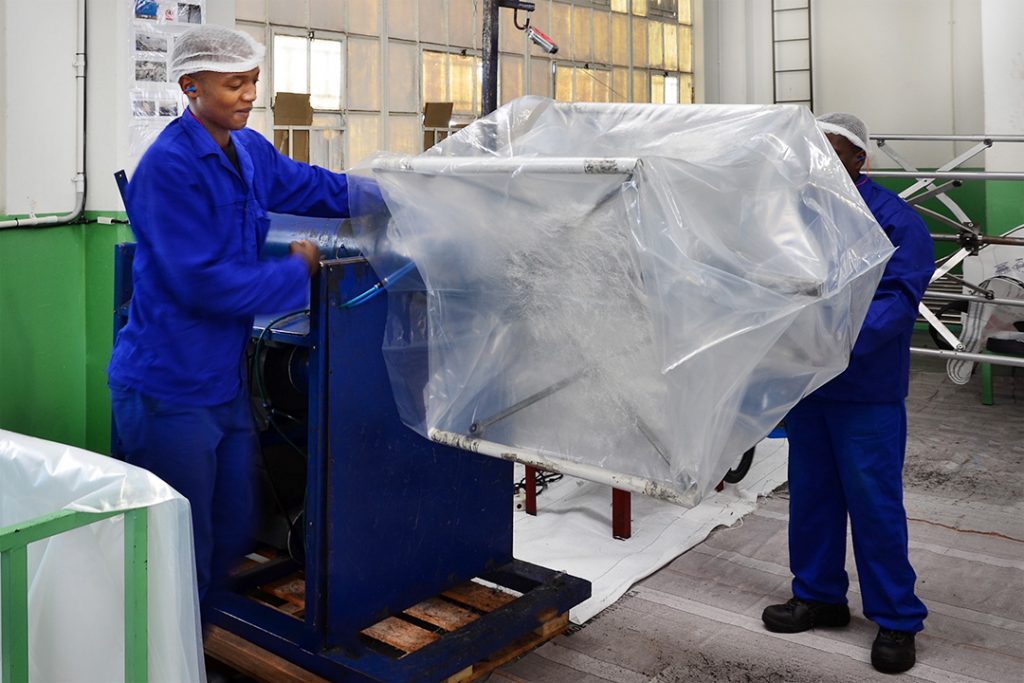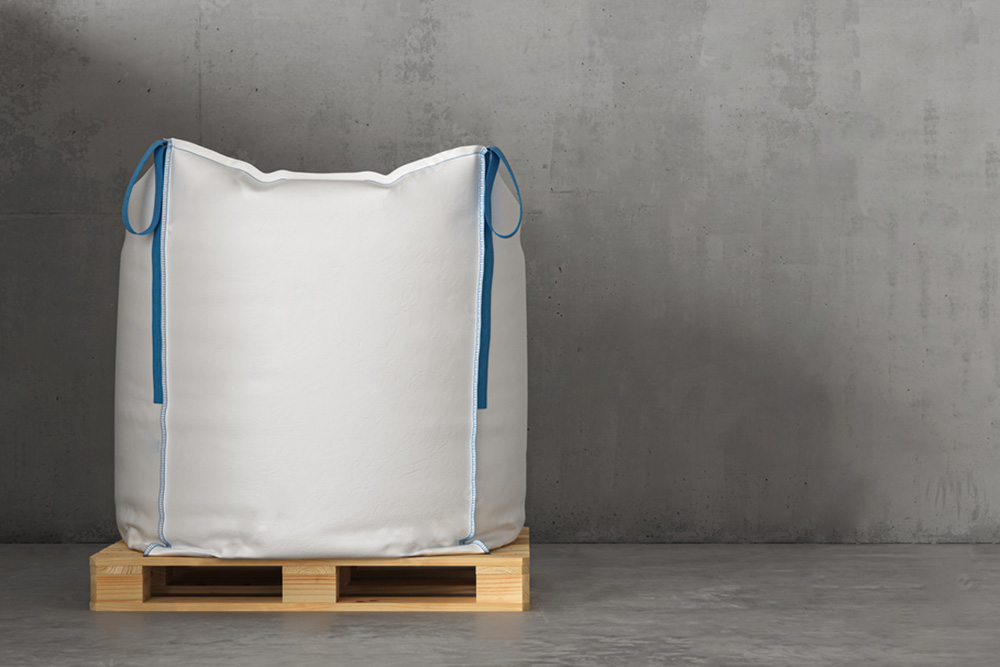Flexible Intermediate Bulk Containers (FIBCs) are being used in new and innovative ways, and they are being adopted in industries that previously didn’t use them. Bulk bags are mostly used to move and store dry or granular materials, but they can also be used for wet products, such as slurry, animal feed and oils.
Custom Bulk Bags is a leading manufacturer and supplier of FIBCs in South Africa. We can guide businesses towards the perfect bulk bag solution for their needs. We manufacture world-class FIBCs from woven polypropylene and offer a variety of optional extras and features. Our bags can be fitted with an inner lining to make them suitable for wet materials and goods with high moisture content.
Companies that handle wet goods turn to FIBCs as their preferred packaging solution because of their flexibility, durability and their manageability. Liquid-heavy materials, by nature, require careful handling. Wet products are heavy and, if not stored correctly, moisture can seep through the lining and the spout bottom, which can become clogged.
Reliability is, therefore, imperative for any transport or storage solution, considering that any lesion or break in the container can lead to contamination or waste of valuable goods. This becomes a financial, operational and health hazard. Bulk bags are designed to hold a lot more weight than any other packaging option. Our products have a minimum safety factor of 5:1, which means that they can safely hold at least five times their intended load.
Naturally, some challenges arise when transporting wet materials. To equip and prepare for these challenges and to mitigate potential risks, here are some tips that will render the use of FIBCs most effective. If followed, these tips can safeguard your team, your goods and your business.
Find FIBCs with a high Safe Working Load
One of the main considerations when it comes to the safe and effective storage and transport of wet materials is managing the weight of your product. Dealing with wet, as opposed to dry, materials entails a marked difference – not only do you need to take into consideration the weight of the product, but you will need to calculate the weight of the liquid that the goods contain as well.
A typical Safe Working Load (SWL) for bulk bags is around one tonne, but bulk bags with a higher SWL are also available in the market. Speak to Custom Bulk Bags to help you choose FIBCs with a higher SWL that will suit your specific needs. These bulk bags are made from thicker and more durable material and the stitches are stronger.
A high SWL will affect how much product you can safely pack into a bulk bag. In order to ensure that your packing is well within the SWL of the bag of your choice, you will need to calculate the cubic foot capacity against the bulk density of your wet goods.

Use Liners to minimise the risk of liquid seepage
The way that FIBCs are designed and made has a large impact on how effectively they perform their function. Bulk bags are made of woven polypropylene, and no matter how finely woven the tapes are, they will still allow some liquid through. Even if the bags are coated, it does not guarantee that they are waterproof, as liquid seeps through the strands of the microscopic gaps in the bags.
The most effective solution for this seepage is to use a polyethylene liner inside the bulk bag. This serves both to keep the moisture inside the bag as well as to prevent the wet goods from seeping out. Liners can generally either be sewn in or purchased separately and they offer a solution that is easy, cost-effective and also functional, in terms of waterproofing and protecting your goods from the elements.
Consider how you will discharge your wet goods
One of the challenges that arise when storing and transporting wet materials is that it is possible for the bottom discharge spout to become clogged, or “bridged”. This is when the product sticks to itself while it is being discharged – typically more common with viscous materials or those that contain solid particles.
This results in time wastage and an increase in safety risks, since people working in the space may try to unblock the spout by hand while it is discharging. They may also try to cut the bag open, which is a safety risk for the personnel involved. It destroys the bag and the goods can become contaminated with strands of polypropylene from the external fabric of the bag.
So how can you avoid these risks? There are two options that present a much safer and more effective solution: one is to choose an oversized bottom discharge. This allows for a speedy discharge, while still retaining a similar amount of control over the release. Your wet goods can be released quickly and without delay, which saves you both time and money.
Another option is a full bottom discharge, which is where the whole bottom of the bag drops out and your goods are released in one go. In this case, there is a flap that is closed during storage or transport and then opened to release the goods, which would otherwise potentially clog up the spout. For example, when transporting wet coffee grounds, this is often the preferred solution.

Choose a good bulk bag distributor
As with any choice of supplier, the level of quality and efficiency depends a lot on who you choose as your FIBC distributor; particularly in the case of transporting wet materials, since it is essential that your supplier be aware of the potential challenges involved and is able to advise and deliver the right FIBC bulk bags for your exact needs.
It is key that your bulk bag supplier has both the experience to advise you and access to the appropriate bags that are perfectly suited to your needs. If you are in the market for bulk bags for wet goods, contact Custom Bulk Bags in order to ascertain which will be the best solution – this will minimise the associated risks and maximise the probability of successfully transporting and discharging your goods.
___
Custom Bulk Bags is a leading South African manufacturer of woven polypropylene bags for various industries, such as mining, chemicals and food. We are able to produce over 3.5-million bulk bags per year, keeping our customers in-stock at all times. Our bags adhere to the highest levels of quality as a result of our stringent in-house testing and quality control programmes.
Custom Bulk Bags holds ISO 9001 certification and we currently have a number of UN-certified designs. We are a Level 3 B-BBEE manufacturer and supplier and fall under the ownership structure of Deneb Investments Limited. For more information on our products, contact sales@custombulkbags.co.za. Follow us on Facebook for our latest news and industry insights.
